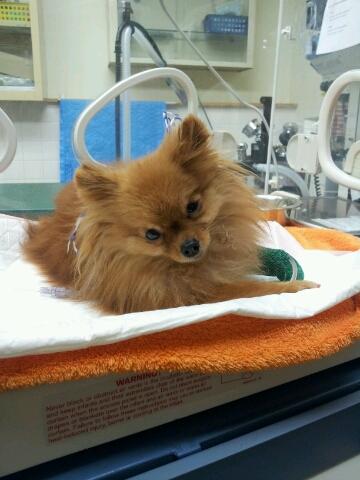Meeka’s Story
Pet First Aid Instructor saves Meeka
 On Saturday, April 19th, 2014, St. John Ambulance Medical First Responders, Ryan Smith, Andrew Adams, Rachel De Young and Gabriel Baylon were on first aid duty at the All About Pets Show. They heard a distressed women calling out for oxygen for her dog that had fallen off a chair and was vital signs absent. Ryan, who is a certified Pet First Aid Instructor, took charge, assessed the situation and began mouth to snout ventilations. Andrew, Rachel and Gabriel followed Ryan’s instructions regarding oxygen delivery, heart monitoring, chest compressions and bystander management. The team worked together to continue life support while transporting Meeka to a veterinary hospital for further treatment. Meeka, a 4 year old teacup Pomeranian, survived the stroke that caused her near death experience due to the quick actions of these four dedicated Medical Responders who were able to adapt their first aid skills to save her life.
On Saturday, April 19th, 2014, St. John Ambulance Medical First Responders, Ryan Smith, Andrew Adams, Rachel De Young and Gabriel Baylon were on first aid duty at the All About Pets Show. They heard a distressed women calling out for oxygen for her dog that had fallen off a chair and was vital signs absent. Ryan, who is a certified Pet First Aid Instructor, took charge, assessed the situation and began mouth to snout ventilations. Andrew, Rachel and Gabriel followed Ryan’s instructions regarding oxygen delivery, heart monitoring, chest compressions and bystander management. The team worked together to continue life support while transporting Meeka to a veterinary hospital for further treatment. Meeka, a 4 year old teacup Pomeranian, survived the stroke that caused her near death experience due to the quick actions of these four dedicated Medical Responders who were able to adapt their first aid skills to save her life.
From left: Andrew, Gabriel, Meeka’s owner, Terry and Ryan Smith celebrate Meeka’s recovery.

First Aid is an important tool for taking care of the ones you love. Many of us have taken a first aid course at some point in our lives for family, school or work related reasons and we have learned some important skills. Your animal companion is more to you than just a pet; they are a member of your family.
As such, have you considered how to recognize a potentially serious condition, and help them if they are injured?
Good first aid knowledge can help to save your pet’s life, reduce the potential for increased injury and promote fast recovery. First aid is not a replacement for going to your vet, but handling emergency situations properly right at the beginning can save you money by recognizing problems early and acting on them quickly.
Pet first aid courses are designed to build an owner’s confidence to respond to an illness or injury situation, administer the appropriate care, or stabilize and transport a pet to the veterinarian. A good course will include preventive care to avoid illness and injury, how to use common household items to restrain and transport an injured animal, and some or all of the following:
- Pet proofing your home
- Shock, unconsciousness, vomiting, dehydration and diarrhea
- Animal fights and bites
- Internal and external bleeding
- Wounds and infections
- Poisons
- Artificial respiration and airway obstruction
- Abdominal thrusts for choking
- Cardiopulmonary Resuscitation (CPR)
- Administering medications
- Parasites, insect bites and stings
- Eye, ear and nose injuries
- Injuries from heat and cold
- Spinal, bone and joint injuries
- Porcupine quills
- Skunk sprays
- Seizures
- Delivering puppies or kittens
Attending a course in person allows for hands-on learning with life-sized specialty animal mannequins. Along with practicing CPR and choking and bandaging, animal mannequins can be used to demonstrate how to adapt common household items such as jackets, sticks, newspaper, saran wrap, duct tape, over-the-counter drugs, old cell phones, ties, belts, rope, scarfs, etc. into first aid tools.
Finally, a good first aid course will provide you with a resource manual for handy reference and a specially designed pet first aid kit.

Consider the newly-developed St. John Ambulance Pet First Aid course. With everything included above, it will be the best six and a half hours you spend on learning how to keep your pet safe and healthy. Proceeds of St. John Ambulance Pet First Aid courses are directed to the St. John Ambulance Therapy Dog Program, a charitable service that brings comfort, joy and companionship to members of the community who are sick, lonely, reside in long-term care and mental health facilities; are in hospitals, schools and library settings. For more information please call (905) 568-1905 or visit www.sjapeel.ca/petfirstaid

